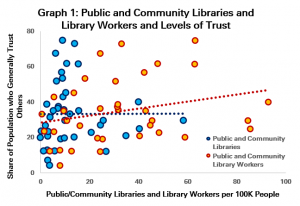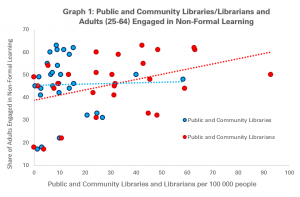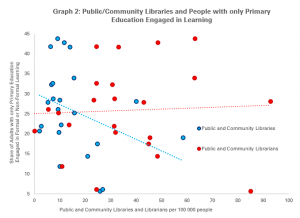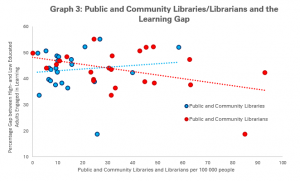The UN International Day of Education (24 January) celebrates the importance of education for peace and development. Libraries have a critical role in ensuring all members of society, of all ages, have access to quality education. To mark this day, this article revisits key moments, shares resources, and summarises IFLA’s activities in the field of education over the past year.
To fuel your advocacy, we invite you to take a look back and consider how your library is helping transform education and bring opportunities to learners of all ages.
Transforming Education
Following the publication of its report, Reimagining our Futures Together: A new social contract for education (2021), UNESCO has been leading a worldwide initiative to transform education to address the challenges of our time. Re-visit IFLA’s brief on this report here: Libraries Contributing to a New Social Contract for Education.
At the centre of this initiative was the Transforming Education Summit, which was held at the UN Headquarters in New York City in September 2022. Ahead of the Summit, UNESCO hosted the Transforming Education Pre-Summit at its headquarters in Paris.
During the Transforming Education Summit, IFLA participated in a side event to discuss the role of access to information and open education resources in making education available to all learners.
In this context, IFLA highlighted the IFLA-UNESCO Public Library Manifesto and School Library Manifesto on the floor of the United Nations.
The Vision Statement released during the Summit by the UN Secretary-General offers a roadmap for education in the 21st century. It is grounded in the principle that the right to quality education should be ensured throughout life, while also including explicit mention of the importance of non-formal education.
This statement will inform further negotiations at the upcoming Summit of the Future, which will be held in 2024.
Resources
- Partner with Libraries to Transform Education – One page explainer
- Key outputs from the Transforming Education Pre-Summit [IFLA news]
- Key moments from the Transforming Education Summit [IFLA news]
Lifelong Learning
The 7th meeting of the International Conference on Adult Education (CONFINTEA) took place in June 2022 in Marrakesh. It brought together ministers, mayors, officials and experts in the field of lifelong learning from around the world. IFLA organised a Side Event on delivering the SDGs through adult learning in libraries.
Key outcomes from this conference include the Marrakesh Framework for Action, which outlines a roadmap of priorities and actions to be taken before the next conference (2033/2034).
In addition to this, UNESCO published two key reports at the time of the Conference – the 5th Global Report on Adult Learning and Education (GRALE 5), and a Handbook on Lifelong Learning Policies.
All three of these key documents include affirmation of the place of libraries within adult and lifelong learning strategies. These can be helpful references for libraries and library associations in calling for stronger recognition at the national level.
Resources
- IFLA’s summary of CONFINTEA VII [IFLA news]
- Marrakesh Framework for Action
- 5thGlobal Report on Adult Learning and Education (GRALE 5) (also available in French and Arabic)
- Handbook on Lifelong Learning Policies
Linking Culture and Education
UNESCO asserts that culture and education make up the backbone of sustainable development. They call for a cultural sector supported by quality education, which in turn is grounded in respect for cultural diversity and human rights.
IFLA affirms that libraries sit at the intersection of education and culture. This was IFLA’s key message during the World Conference on Cultural Policy for Sustainable Development (Mondiacult 2022), hosted in Mexico City in September 2022.
Ahead of the conference, IFLA’s ResiliArt x Mondiacult event, Library Voices Joining the Global Conversation on Cultural Rights, explored this topic in depth. A panel of experts discussed how libraries enable inclusive and meaningful access to culture and create synergies between culture and education.
During Mondiacult 2022, IFLA was delighted to organise the side event, “Accelerating Education-Culture Linkages through Collaboration: Exploring partnerships with libraries and other cultural institutions”.
The resulting Mondiacult Declaration acknowledges the essential role of libraries in underlining the importance of enhancing synergies between culture and education – strengthening appreciation for cultural diversity, multilingualism, arts education and digital literacy for learners of all ages.
Looking ahead at 2023, IFLA will be involved in UNESCO’s continuing initiative to link culture and education through the renewal of the framework for culture and arts education. Learn more here: UNESCO Culture and Education.
Resources
- ResiliArt x Mondiacult: Library Voices Joining the Global Conversation on Cultural Rights [Debate summary + video clips]
- IFLA ResiliArt x Mondiacult 2022: Report on Outcomes and Recommendations
- IFLA Brought the Voice of Libraries to Mondiacult 2022 [IFLA news + side event video]
Climate Empowerment
Another key topic in the discussion on education for sustainable development is climate education.
The UN Framework Convention on Climate Action and the Paris Agreement include education as an aspect of Action for Climate Empowerment, alongside climate training, public awareness, public participation, public access to information, and international cooperation.
IFLA participated in the 27th United Nations Climate Change Conference (COP27) in November 2022. We took part in discussions on the role of libraries in empowering climate action through education and access to information.
There is a lot of scope to highlight the role of libraries in supporting climate action through education – both among children and youth as well as learners of all ages.
Resources
- Policy Brief: Libraries and the Glasgow Work Programme on Action for Climate Empowerment
- The 2022 UN Climate Change Conference (COP27): Outcomes and opportunities for libraries [IFLA news]
***
Where do you see your library, or libraries in your country or region, having an impact in transforming education and linking it to other sustainable development goals? How can you make your impact known among decisionmakers?
Share your thoughts and ideas!
Questions and comments: [email protected]



